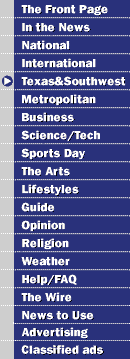|
06/11/93
ATF commanders erred in cult raid, panel chief says
By Lee Hancock / The Dallas Morning News
WASHINGTON-ATF commanders erred in deciding to execute a raid on the Branch Davidian compound even after learning that the operation might have been compromised, the head of a congressional committee reviewing the Waco tragedy said Thursday.
Rep. Steny Hoyer, D-Md., also criticized the decision by two Houston commanders to participate directly in the raid instead of supervising from behind the scenes.
He said the ATF commanders should have called off the raid after learning from an undercover agent inside the compound just before the raid that David Koresh was telling followers that the ATF was on its way.
"The most troubling aspect of this is the plan or the lack of carrying out a plan with reference to aborting the mission,' he said. "In my own view, it would appear that his decision was clearly, in retrospect or in hindsight, in error.'
Retired Los Angeles police SWAT commander Jeffrey Rogers told committee members that his agency would "never have considered' going ahead with the raid if they had known before leaving their staging area that the raid's target "knew we were coming.'
While still at their staging area, ATF commanders learned from their undercover agent that Mr. Koresh had flatly stated that he knew the ATF was on its way and he would not be taken alive. ATF officials have repeatedly contended, however, that the statements were no different than Mr. Koresh's earlier warnings to the undercover agent and others inside the compound.
Mr. Hoyer conceded that the committee had agreed not to directly question ATF officials about the commanders' decision during the two-day hearing. ATF officials have repeatedly said that until completion of an ongoing independent review by the U.S. Treasury Department, they cannot discuss what the commanders heard from the undercover agent and why they decided to go ahead with the raid.
Some ATF officials say privately that the ongoing Treasury Department review will probably reach similar conclusions, criticizing the decision to execute the raid. They predicted that the review also will strongly criticize the commanders' decision to ride with agents approaching the compound in cattle trailers or in a helicopter overhead.
The two commanders, Houston ATF chief Phil Chojnaki and his assistant, Chuck Sarabin, have been ordered not to publicly discuss what happened.
But ATF officials have said they decided to go ahead with the raid because no one-including the undercover agent-saw any indications that the cult was preparing for an armed confrontation.
During Thursday's hearing, members of the House Appropriations subcommitee criticized the agency's communications planning, citing a taped 911 conversation made just after the Feb. 28 raid disintegrated into a firefight.
After cultists called 911 and screamed that men were circling the rural compound and "shooting at us,' a McLennan County sheriff's deputy who took the call spent frantic minutes trying to reach the ATF communications van that his superiors had told him to contact in the event of an emergecy.
Rep. Ernest Jim Istook, R-Okla., also told ATF officials that the 911 tape suggested that ATF planners did not develop an adequate contingency plan if the raid went sour.
"It did not appear that there was a backup plan, what do you do if repulsed, how do you have a withdrawal. How do you have communications,' he said.
ATF senior officials said they did not know why the deputy sheriff who took the 911 call did not simply contact a command post set up by ATF officials to manage the raid or contact three other sheriff's deputies assigned to work with ATF during the raid.
"Instead, he sent someone in a patrol car to contact us,' said Dan Hartnett, an ATF deputy director.
Mr. Hartnett also said that the 100-agent raiding party had planned two separate escape routes that would allow them to call off the raid even after turning onto the road leading to the compound.
"But once they got out other trailers, they were receiving fire,' he said.
Two teams trying to breach the compound's front door were repulsed by heavy fire and took up defensive positions, he said.
Because the third team, comprised of New Orleans agents, was on another side of the building and was not receiving fire, they continued their mission to capture the cult's second-floor arsenal.
But after mounting the compound roof, he said, the gunfire aimed at the other teams momentarily subsided, and gunshots began smashing through the roof and windows at the New Orleans agents.
"They were moving the people around inside,' Mr. Hartnett said.
Tactical experts from Dallas and Los Angeles police departments
also appeared before the committee Thursday, and all agreed that aborting the raid would have been impossible after agents passed a final, pre-arranged point.
After Los Angeles SWAT teams pass a final position for aborting the raid, they do not retreat even if fired upon, Los Angeles SWAT commander Thomas Lorenzen said.
"If we're in a dynamic mode, we're going through doors and windows, that mode is going to continue,' Lt. Lorenzen said.
Perhaps the most combative exchange of the two-day hearing came when Rep. Peter Visklosky, D-Ind., contended that ATF officials may have lied about evidence of drugs inside the compound in order to get access to three Texas National Guard helicopters in the raid.
ATF officials asked for use of the helicopters, which were hit by gunfire during the raid, after a National Guard surveillance plane detected hot spots inside the compound commonly associated with methamphetamine labs. They also cited statements from former cultists that a methamphetamine lab had been seen inside the compound.
Federal agencies can use National Guard equipment without charge in such operations if there is evidence of drugs involved but must otherwise reimburse for its use.
Mr. Visklosky heatedly suggested that the witness statements were five years old and the presence of hot spots to detect drug labs had been determined to be ineffective by the federal Drug Enforcement Administration.
But ATF officials angrily disputed Mr. Visklosky's accusation, stating that they could easily have obtained helicopters from a number of sources and even rented one used during the raid.
"I think you're wrong,' ATF Director Stephen Higgins told the congressman. Added Mr. Hartnett: "We could've gotten the same equipment from them and just reimburse them. From (the U.S) Customs (Service), we could have gotten them for nothing. The money to reimburse the National Guard is of no consequence.'
|


![]()



